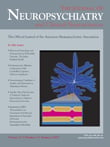To the Editor: A 48-year-old man with 8 years of education came under our care in November 2007 for right upper-limb rigidity. In April 2006, he had undergone single photon emission computed tomography (SPECT) with DatSCAN that revealed a normal uptake at nigrostriatal levels. We repeated a SPECT with DatSCAN and revealed a bilateral loss of uptake particularly in the left putamen and in the left caudate nucleus. Uptake was normal in the right caudate nucleus. [ 18 F]fluorodeoxyglucose (FDG)-positron emission tomography (PET) revealed a normal cerebral metabolism. Clinical symptoms, SPECT findings, and the strong positive response during the L -dopa test led us to a diagnosis of Parkinson’s disease. The patient also tested positive for human immunodeficiency virus (HIV+).
Neuropsychological evaluation revealed preserved cognitive functioning (episodic memory, attention, executive functions, abstract reasoning, visuospatial skills, limb praxis, and constructional praxis) with only a low level performance, even if within normal range, for delayed free recall on the Rey Auditory Verbal Learning Task. If there was a normal result in classic tasks for the assessment of executive functions based on the dorsolateral prefrontal cortex (Stroop Interference Test, Frontal Assessment Battery, Wisconsin Card Sorting Test, and Trail Making test), then performance on a task assessing executive functions based on the ventromedial prefrontal cortex showed impairment. During the Iowa Gambling Task,
1 a test for the assessment of decision making under ambiguous/uncertain conditions, the patient preferentially selected cards from risky, “long-term disadvantageous” decks, resulting in a final negative outcome (−955). Final balance between choices from advantageous decks [C+D] and choices from disadvantageous decks [A+B] reported a negative score (−6).
Patients who are HIV+ can present decision-making impairment,
2 correlated with deficits of inhibitory processes (Stroop Interference Test) and episodic memory. Patients with Parkinson’s disease may also present decision-making impairment,
3 even if the underlying causal mechanism is not known. Some authors
3 propose that decision-making impairment is related to amygdala dysfunction, while other authors
4 suggest that it is related to impaired reinforcement learning, especially from negative feedbacks, due to the effects of dopamine replacement therapy on the orbitofrontal frontostriatal circuit.
Both movement disorders and cognitive dysfunction may represent the initial manifestation of HIV, probably due to the predilection of HIV infection to affect the basal ganglia and frontal white matter.
5 The cognitive performance of our patient (intact executive functions and impaired decision making) shows that the association of two diseases causing frontostriatal impairment, like Parkinson’s disease and HIV, may produce a specific neuropsychological pattern, different from that usually associated with Parkinson’s disease or HIV.
Our finding shows that in a patient with new concomitant diagnoses of Parkinson’s disease and HIV, decision making can become impaired despite intact cognitive functioning. Our finding also confirms the usefulness of gambling tasks as a tool to detect early cognitive impairment in patients with HIV and patients with Parkinson’s disease.

